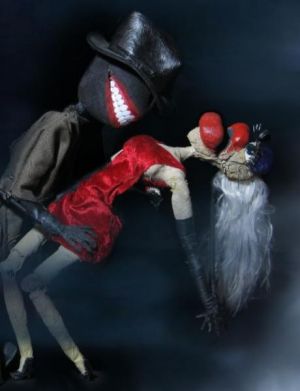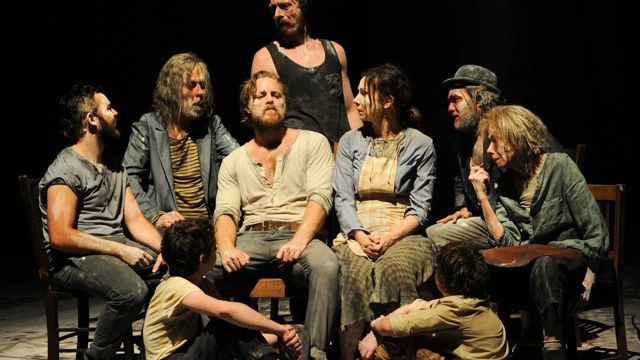Festival Fever Leaves Some Cold
It’s becoming a growth industry. No longer is one festival a year for enough for Australia’s major cities. Now Cabaret, Fringe, Comedy and even festivals of light are cramming the diary. Is the feast for audiences good for local artists? David Spicer speaks with the Directors of the Sydney, Perth and Adelaide Festivals.
It was a hot topic on a recent Arts Hub forum. In one corner was the pro-festival lobby. Esther Anatolitis the Director of Regional Arts Victoria, gushed about getting her hands on the `treasure’ in a festival program.
“Every time you pick up a festival guide you are holding a critically timely interpretation of artistic thought, experimentation and craft,” she wrote.
“For artists, festivals offer the opportunity to locate their practice and present their work within a cultural moment. Audiences too love the opportunity of immersing into all that inspiration.”
Mary Lou Jelbart, the Artistic Director of the Melbourne venue fortyfivedownstairs, begged to differ. She says there are so many festivals in Melbourne she almost needs to close down for half the year.
“Try getting media coverage for a production during the Comedy Festival (sponsored by Fairfax). Try getting an audience during Melbourne Festival (with virtually no hope of print media cover or perhaps a grudging review from an overloaded critic).
“While festivals make politicians feel good (all those free tickets) they tend to depress those of us who don’t quite fit the festival mode, who just want to present good theatre and build up loyal audiences.
“There are limited discretionary dollars to go around and a huge amount of them are going to the Festival imports, at the expense of the local independent scene.”
A new breed of artistic director is now running the Perth, Sydney and Adelaide festivals. All are from Europe and quick to trumpet their support of local artists.

Lieven Bertels is leading the Sydney Festival for the first time in 2013.
Sydney’s calendar is filling up too. The Sydney Festival in January has now been joined by Vivid in winter, a festival of light and ideas.
From Belgium, Lieven Bertels was the artistic coordinator of the world-renowned Holland Festival, which he says ran on a different model.
“A lot of what we presented at the Holland Festival resulted from money flowing through to local theatre companies to put a show on,” he said.
He’s tried to do the same in Sydney where possible.
“One that excites me personally is a beautiful new work called Symphony by the Legs on the Wall company.”
The work combines dance, multi-media and a guitar performance of Beethoven developed by the company in northern NSW.
“It shows you can develop an international standard work in a regional arts centre and make it ready for the stage of an international arts festival. I signed it sight unseen but it is good to take a risk.”
The highest profile local production is the World Premiere adaptation of The Secret River by the Sydney Theatre Company, directed by Neil Armfield. (Read Frank Hatherley's review)
“It has success written all of over it. It’s very hard to cook a bad meal with wonderful produce.”
But Lieven Bertels is passionate about the international aspect of the Festival.
“Many people can’t travel to London and New York. It’s good to recalibrate the benchmarks and create a festival buzz. It worked beautifully in Holland with local and international artists in one room – suddenly a new project is born.”
For audiences there is also the opportunity to see extraordinary productions. He nominates Semele Walk, a Handel opera staged by a German theatre company which incorporates a fashion show of 20th century punk.
Also remarkably a Swiss theatre company has a hit play which is named after an Aboriginal word - Eraritjaritjaka. It means full of desire for something that has been lost.
“A character walks off the stage, is followed by a video camera, gets into a taxi and arrives at an apartment. He delivers the rest of the play from there. He fries an omelette and the audience smells it in the theatre. It’s mind bogglingly brilliant.”
The Perth International Arts Festival – founded in 1953 - is the longest running festival in the southern hemisphere. It towers over the local arts scene, attracting an audience of 800,000 people to the plethora of free events and sells four to five million dollars’ worth of tickets.

At the helm is the Director Johnathan Holloway. He came to Western Australia after a successful stint at the Norfolk & Norwich Festival.
Even though it’s called the Perth International Arts Festival he works very hard to foster local connections.
“We work closely with Perth theatre companies. A vital part is commissioning new work.”
The Barking Gecko Theatre Company is using the festival as a launching pad for a new work for children called Death, Duck and the Tulip. The 50 minute piece has a cast of two and an orchestra of four – all locals.
International works are also often staged and re-interpreted by local artists.
Johnathan Holloway is particularly excited about 3G (Trois Générations)from French choreographer Jean-Claude Gallotta.
“It has three generations of dancers, under 12, 20’s and 50’s. Each dances a piece about their generation, however it has been remodelled by a local company and local dancers.”
And when the cast or performers are imported a local workshop is obligatory.

He says the best festivals offer works that showcase both international and regional productions.
“If you took the Edinburgh Festival out of Edinburgh it wouldn’t be the same.
“It heightens local artists and gives them new inspiration.”
Completing a trilogy of Europeans running Australia’s arts festivals is David Sefton from Adelaide in South Australia, which has a slogan for being the festival state.
He came to the role after spending a decade running the UCLA’s live performance division in Los Angeles and prior to that working at Southbank in London.
Sefton acknowledges that festivals are growing like topsy in Australia.
“Perhaps they could set up a committee to decide who uses it. Three mates with a cello say it is a cello festival,” he noted wryly.
Adding to the traffic is the fact that from 2013 the Adelaide Festival is becoming an annual event.
But David Sefton says help is on the way.
“I have also got double the funding; that is the major battle. A biennial festival is much harder. Many companies don’t know what they are doing two years in advance.”
Like his UK colleagues he’s keen to trumpet local involvement, particularly the state’s elite dance companies and symphony orchestras which regularly fill the program
“Whilst there are lots of companies which don’t make it into festivals we have a very healthy relationship with the State Theatre Company of South Australia. Their production of Kreutzer Sonata starring Barry Otto is the perfect example of a play in a conventional space, put on with festival audience in mind.”
 There is one new production he is particularly proud of. Brink Productions has joined forces with English Touring Theatre, one of the UK’s leading production companies, to stage Thursday. It takes reference from the remarkable story of Adelaide woman Gill Hicks, who lost her legs in the 2005 London bombings.
There is one new production he is particularly proud of. Brink Productions has joined forces with English Touring Theatre, one of the UK’s leading production companies, to stage Thursday. It takes reference from the remarkable story of Adelaide woman Gill Hicks, who lost her legs in the 2005 London bombings.
“Gill Hicks was the last person pulled out of London tube bombing alive. It has been co-commissioned by a local and a UK company and will later go on tour.”
The Adelaide Festival also has a reputation of pulling something out of the hat which is on the edge of public taste.
“Our audience is pretty unshockable.”
But for those who might like to be shocked, he recommends an adult puppet show called Murder, inspired by Nick Cave & The Bad Seeds' Murder Ballads.
It’s billed as a performance which lusts for a sinister life that conjures up a dark world of love, sex and death.
Sounds like a good use for taxpayers’ money!
The Sydney Festival runs from January 5 to 27, 2013. The Perth Internatinal Arts Festival is from February 8 until March 2. The Adelaide Festival is from March 1 – 17.
Images (from top): Daniel Henshall, Bruce Spence, Callum McManis (sitting) Nathaniel Dean, Matthew Sunderland (standing), Anita Hegh, Rory Potter (sitting), Jeremy Sims and Judith McGrath in Sydney Theatre Company’s The Secret River © Heidrun Löhr; Semele Walk, photographer: Monika Rittershaus; Eraritjaritjaka, Photographer: Mario Del Curto; Murder and Thursday.
Originally published in the January / February 2013 edition of Stage Whispers.
Subscribe to our E-Newsletter, buy our latest print edition or find a Performing Arts book at Book Nook.

